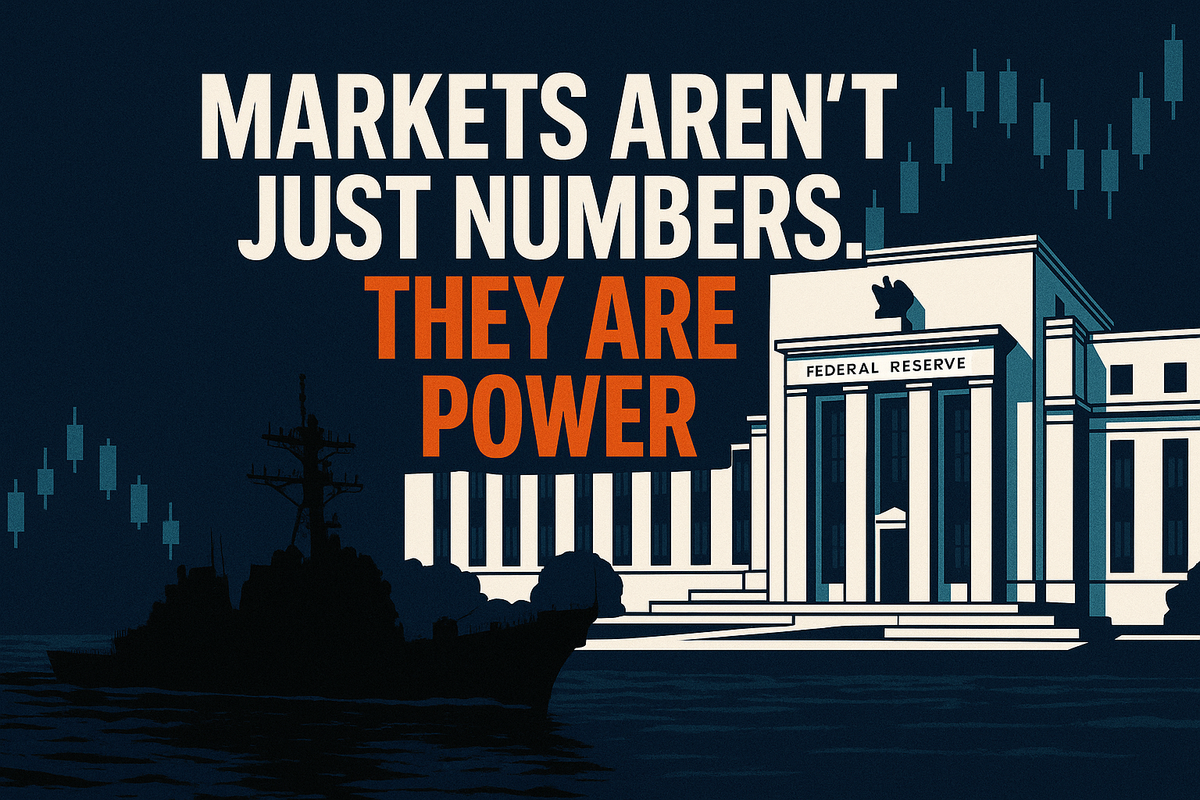Markets Aren’t Just Numbers. They Are Power.

3 Key Takeaways
- Powell’s Jackson Hole speech showed markets price politics, not policy.
- U.S. warships off Venezuela prove power moves oil, not earnings.
- Numbers look neutral, but they mask struggles over leverage.
Numbers Are Never Neutral
Markets appear mathematical: indexes, charts, percentages. But behind the digits are choices about who wins and who loses.
This August made that truth undeniable.
When Words Move Markets
At Jackson Hole, Jerome Powell didn’t just talk inflation. He signaled to politics. A hint of a September rate cut sent stocks higher, bond yields lower, and the dollar weaker within minutes.
That wasn’t about economic models. It was about political pressure. Donald Trump had openly attacked the Fed for “choking growth,” and Powell’s tone showed that Washington’s weight matters as much as inflation data.
Markets weren’t reacting to policy. They were reacting to power.
Wall Street jumps after US Fed's Powell signals possible rate cut — The Guardian
Record Highs, Fragile Ground
The S&P 500 and Nasdaq keep climbing on AI optimism and expectations of easier money. Headlines celebrate the rally. But beneath, tariffs, protectionism, and slowing global growth gnaw at the foundation.
Markets rise because capital has no safer home. But that doesn’t mean stability. Numbers look bullish. Power looks brittle.
S&P 500 seen stalling as AI rally meets tariff jitters — Reuters
When Warships Move Markets
Markets don’t just respond to central banks. They respond to hard power.
This month, the U.S. deployed three destroyers — the USS Gravely, USS Jason Dunham, and USS Sampson — off Venezuela’s coast, with Marines, submarines, and surveillance aircraft. Washington framed the mission as a counternarcotics push.
In Venezuela, that isn’t a euphemism — the Maduro regime has long blurred the line between state and cartel. Markets know it: Venezuela trades like a narco-state, not a normal oil exporter.
- Washington’s message: Power will be projected, not negotiated.
- Maduro’s reply: Mobilizing millions of militia, denouncing it as an “illegal regime-change attempt.”
- The consequence: Oil, sanctions, and capital flows suddenly priced military risk, not earnings.
Trump Orders Pentagon to Deploy Three Warships — WSJ
Venezuelan President Nicolás Maduro condemns US destroyer deployment — NY Post
Venezuela as a Market Case Study
Bond traders don’t treat Venezuela like a distressed sovereign. They price it like an outlaw. Secondary market debt trades at extreme discounts, reflecting not just default risk, but the perception of state–cartel fusion.
Oil tells the same story. Futures swing less on OPEC statements and more on the credibility of U.S. sanctions or the likelihood of military enforcement. When Chevron gained partial approval to operate, markets didn’t celebrate recovery — they measured how tightly Washington held the leash.
For investors, Venezuela is the clearest reminder that markets don’t just measure economics. They measure leverage.
Noise vs Signal
It’s easy to mistake digits for meaning. Indexes, growth rates, and yield curves look neutral. But that is noise.
The signal is Powell bending under political heat. The signal is destroyers off Caracas. The signal is tariffs, sanctions, and chokepoints where capital collides with geopolitics.
Numbers are the mask. Power is the face.
So, What for Investors and Strategists
If you see markets as math, you’ll misread the world.
- For investors: Price risk through politics, not just models. Powell’s hint mattered more than CPI. Destroyers off Venezuela matter more than oil inventories.
- For policymakers: Data without power context misleads. Inflation prints mean little if bond markets are pricing geopolitical risk.
- For citizens: Markets dictate mortgages, pensions, and wages. But they respond to speeches and warships as much as spreadsheets.
Understanding markets means understanding power.
Closer:
Markets aren’t neutral. They are the sharpest expression of power in our time.





